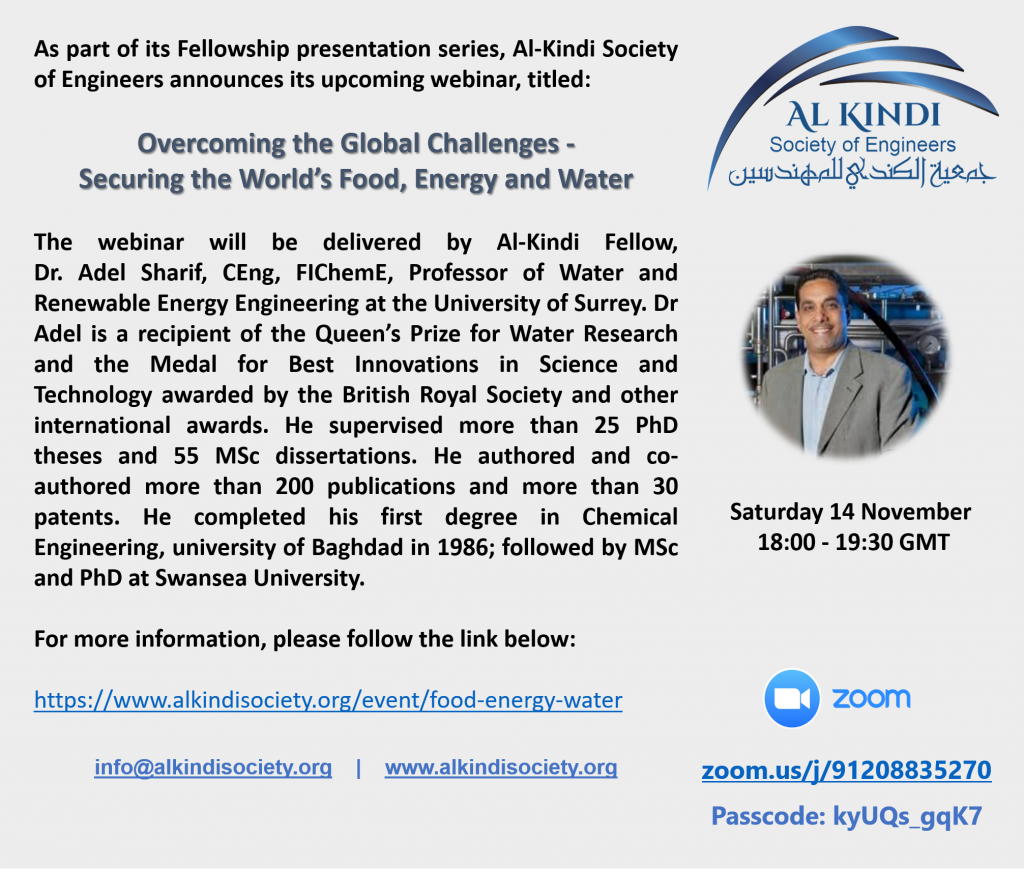
- This event has passed.
Overcoming the Global Challenges – Securing the World’s Food, Energy and Water
November 14, 2020 @ 6:00 PM – 7:30 PM

Invited Speaker: Dr. Adel Sharif.
Food, Energy and Water (FEW) are linked inextricably and are important requirements for national security and economic development of nations. To make enough food for a growing world population, more water and energy are needed. Ensuring water is accessible and clean for human consumption demands energy and diverts water resources from agriculture. Additionally producing energy requires water. Energy production is further constrained by the need to limit greenhouse gas emissions.
At the centre of the FEW nexus lies the global challenge of climate change and poverty. Critical to achieving sustainability and eradicating poverty is to have sustainable energy and water supplies that have little or no geographical or climatic condition constraints. This appears near impossible or far reaching given the current rate of consumption of the world’s energy and water resources and the status of scientific and technological development.
For energy, this is true because fossil based energy sources are available in certain places around the world which presents a geographical, logistical and political constraints. Additionally they have negative impact on the environment, which has resulted in the challenge of Climate Change. Renewable energy sources, on the other hand, whether solar, wind, tidal, hydropower, etc., though have much less negative impacts on the environment; they are not free from geographical and climatic constraints regardless of their development status. In other words, they are not available to every country, never mind their still high capital and installation costs, which can be restraining factors.
The global water situation is not different from that of energy. The most populated parts of the world suffer from water shortages and most of the larger cities in the world are located near the sea. Tapping into seawater was considered as an option solution for freshwater supply, but desalination is an energy intensive technology, which limits its use to wealthy and oil rich countries.
Hence low cost and secure energy is the key to a prosperous world. Low cost energy will impact water and food production positively as there is a plenty of water in the sea and there is little or no shortage of agricultural land. This will also have a positive effect on the environment and helps reducing the impact of climate change. Out of the box thinking suggests an energy source that has little or no constraints and that is Gravity. Gravity is everywhere with an infinite range and no geographical nor climatic limitations. Turning gravity to an exploitable energy source for electricity production and direct pumping, would present a great leap in technological advancement. Investigating the possibility of producing electricity using gravity is currently carried out by a limited number of researchers. If they succeed, the potential would be huge with a global impact and opportunities.
About the Speaker
Dr. Adel Sharif, CEng, FIChemE, Professor of Water and Renewable Energy Engineering at the University of Surrey. Dr Adel is a recipient of the Queen’s Prize for Water Research and the Medal for Best Innovations in Science and Technology awarded by the British Royal Society and other international awards. Dr Adel supervised more than 25 PhD theses and 55 MSc dissertations. He authored and co-authored more than 200 publications and more than 30 patents. He completed his first degree in Chemical Engineering, university of Baghdad in 1986; followed by MSc and PhD at Swansea University.

